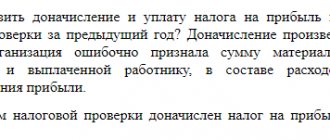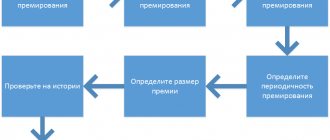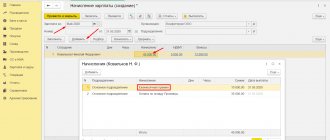Is the bonus part of income always related to salary or not?
Answers to the questions of whether a bonus is subject to taxes and contributions and what taxes are paid on bonuses to employees can be obtained by understanding what a bonus is.
A bonus is an incentive or incentive payment to an employee assigned for the successful performance of job duties. The bonus can also be paid for a specific event.
What kind of awards there are, read here.
The inclusion of bonuses in salary is not mandatory. But this can be done (Articles 129, 191 of the Labor Code of the Russian Federation), and employers quite often allocate a bonus part in the remuneration system they have developed. This allows them to solve two problems:
- influence on the employee’s interest in the results of his work;
- the possibility of regulation due to the bonus part of the amount of labor costs attributed to expenses.
Under what conditions does the employer have the right not to award a bonus or reduce its size? Is it possible to deprive an employee as a disciplinary sanction? You will find answers to these and other questions in the Guide from ConsultantPlus. Get free access to the system and go to the material.
For the procedure for paying bonuses under labor laws, see here.
The bonus can have two sources of payment:
- costs - for bonuses accrued in connection with labor achievements;
- net profit - for bonuses paid on the occasion of events not related to work.
Regardless of the source of payment, bonuses may be included in the wage system. But even if the bonus is not included in the incentive part of the salary, if it is one-time and paid out of profit, it still remains the employee’s income. And this determines the mandatory taxation of premiums.
For more information about the document establishing the remuneration system, read the article “Regulations on remuneration of employees - sample - 2022 - 2021” .
Let's consider what tax is imposed on bonuses to employees, as well as what insurance contributions need to be paid to the budget.
Assignment of bonuses
The procedure for calculating bonuses in a company is usually prescribed in the Regulations on bonuses and the collective agreement. The following types of payments are distinguished:
- depending on performance indicators;
- not related to work results.
The first are included in the wage system, and most often are regular. The latter are assigned from case to case, and are mainly issued at the expense of net profit. Anniversary bonuses for employees or the company are payments that do not depend on performance results. Read more about the types of awards here.
Accrual is made based on the order of the manager. The order indicates the reason for the payment and the list of those who will receive it.
What insurance premiums are charged on the premium and is personal income tax paid on it?
So, what is the taxation of bonuses to employees in 2020-2021, is income tax levied on the bonus?
Since the incentive payment is part of the salary, there is no need to wonder whether bonuses are subject to income tax and insurance premiums. Of course they are taxable! A bonus is part of an employee’s income, and on it, as well as on other components of remuneration, it is necessary to accrue all insurance contributions for compulsory pension, social and medical insurance and withhold personal income tax.
Taxation of bonuses to employees with income tax is carried out taking into account the norms of Chapter. 23 Tax Code of the Russian Federation.
NOTE! Prizes for achievements in the field of education, literature and art, science and technology, and the media according to the list of awards approved by the Government of the Russian Federation (clause 7 of Article 217 of the Tax Code of the Russian Federation) are not subject to personal income tax.
Taxation of 2021-2022 premiums is subject to the provisions of Sec. 34 of the Tax Code of the Russian Federation and the law “On compulsory social insurance against accidents...” dated July 24, 1998 No. 125-FZ.
According to what rules are bonuses paid to an employee after dismissal taxed, ConsultantPlus experts told:
Get free access to K+ and learn all the nuances.
Accrual procedure
The procedure for calculating such a bonus is simple, but requires coordinated actions of employees of several departments (we talked about the principle and how bonuses are calculated to employees in a separate article).
Registration and maintenance of personal files of employees is one of the main functions of the HR department. As a rule, it is the personnel officer who monitors employee anniversaries and launches the mechanism for calculating anniversary bonuses.
Preparation of papers
Payment of incentives to an employee requires documentation for further taxation. Article 252 of the Tax Code of the Russian Federation requires documentary support for the company's expenses; confirmation is required in the form of a link to the clause of the collective agreement or labor agreement regulating incentives.
Issuing funds to an employee
The incentive payment system must comply with Article 191 of the Labor Code. Bonus payments that are not related to the labor process can be paid directly on the anniversary day, and not with the rest of the salary.
Registration of the procedure
Registration of the incentive involves the following steps:
- drawing up a memo with a proposal to reward the employee, the essence and amount of the awarded bonus;
- agreeing on the payment amount with the accounting department to ensure it is available by a specific date;
- submitting the paper for consideration to the head of the company;
- execution of an order for bonuses based on a signed memo, as required by Resolution of the State Statistics Committee of the Russian Federation No. 1 (January 2004);
- solemn congratulations to the employee;
- confirmation of the fact of familiarization with the paper (signing);
- making a record of bonuses in the company personnel records.
Petition
The purpose of the petition for an anniversary payment is to encourage management to pay the bonus. Given the absence of a template, it is written in free form with the following structure:
- title “Application for bonus No.”;
- day, month, year of paper submission;
- information about the employee nominated for the award (example: V.V. Andreev, freight forwarder, has been continuously working at Parma LLC for 10 years, all this time he has been a reliable professional employee, an example for colleagues, and has taken part in training young people);
- bonus motive (example: for impeccable work and for the 55th anniversary);
- type and amount of incentive (example: I propose to reward V.V. Andreev with a cash bonus in the amount of 15,000);
- signature of the applicant (example: head of department R.N. Sorokin).
The petition is characterized by an expanded approach to the bonus motive. The document emphasizes the employee’s personal and professional qualities and special merits.
You can learn more about how to correctly write a request for a bonus for an employee, as well as see a sample document here.
Service memo
ATTENTION! A variant of the document addressed to the director with a request for a bonus for the hero of the day is a memo. It can be submitted by the head of the unit or the chairman of the organization's trade union.
The memo is written in the following format:
- “header”, reflecting the details of the head of the enterprise to whom it is addressed, and information about the originator;
- the name of the document in the middle of the sheet “Memo on bonuses”;
- the text of the note, including a proposal for encouragement in the form of a bonus (example: for 15 years, senior inspector Semenkevich E.A. has proven herself to be a competent and efficient specialist, which is confirmed by bonuses and certificates from management. I ask for impeccable work and in connection with the 50th anniversary award Semenkevich E.A. the company’s gold insignia and a bonus in accordance with the collective agreement);
- date of filing the note;
- signature of the compiler (example: head of personnel service Tsoi A.V.).
Position
The provision on bonuses (Article 135 of the Labor Code) does not apply to the company’s mandatory documents, but is often developed due to its usefulness:
- it is more convenient to adopt a single document regulating the incentive system without overloading employee contracts;
- the fact of having a bonus paper stimulates employees to improve their work results;
- The provision serves as documentary justification and confirmation of expenses for employee incentives, allowing to reduce the amount subject to income tax.
The regulation determines the procedure for calculating incentive payments:
- bonus conditions;
- amounts of payments;
- list of employees covered by the document;
- frequency, timing and sources of payments;
- procedure for issuing incentives;
- persons responsible for making decisions on incentives;
- bonus rules.
You can find out how to draw up an order approving the bonus regulations here.
Order of encouragement
REFERENCE! An order to award an employee a bonus is issued on the basis of the submitted proposal and contains a note about the decision made and a deadline for execution. The hero of the day must be familiarized with the order against signature.
We talked more about how to fill out an employee incentive application using the sample for paying a bonus in this article.
To draw up an order, the T-11 form has been developed, but it is also permissible to issue it in free form, indicating:
- Date and place of compilation.
- Details of the hero of the day.
- Reasons for bonuses (example: for long-term and conscientious work and to commemorate an anniversary). You can view the list of reasons for paying bonuses here.
- Type of incentive (example: I order you to declare gratitude with an entry in the work book and award a bonus in the amount of 20,000 rubles).
- Grounds for the order (example: based on the petition for incentives dated June 22, 2012 No. 12).
- Signature of the manager with transcript.
We talked in detail about how to draw up an order for bonuses for an employee here.
Are there any specifics to taxes on bonuses that are paid from net profit?
Is a 2021–2022 bonus paid to an employee out of net profit, for example, on a holiday, taxable or not?
As income received by the employee, any bonuses are subject to personal income tax, and this tax must be withheld from the employee’s bonus. The source of the premium payment in this case does not matter.
Are premiums subject to insurance premiums when paid out of net profit?
Here the emphasis should be placed not on the source of funding for the bonus, but on its connection with wages. If the bonus is a labor bonus, then there can be no questions: the contributions are paid. If not, there are two possible points of view.
Officials believe that contributions for such a bonus should also be calculated (clause 1 of Article 420 of the Tax Code of the Russian Federation and clause 1 of Article 20.1 of Law No. 125-FZ dated July 24, 1998, letter of the Ministry of Finance dated October 25, 2018 No. 03-15-06/ 76608). For income tax purposes, these contributions can be taken into account in full as expenses that reduce the profit base (subclause 49, clause 1, article 264 of the Tax Code of the Russian Federation, letter of the Ministry of Finance of Russia dated April 2, 2010 No. 03-03-06/1/220 ).
The courts are against contributions from bonuses that are not of a labor nature.
Read more about this here.
Anniversary bonuses: taxation and insurance premiums
Regardless of the nature of the accrual or the source of expenses, a bonus for an employee’s anniversary, as well as in connection with other significant dates and holidays, is subject to personal income tax (Article 208, paragraph 1 of Article 210 of the Tax Code of the Russian Federation). Tax is withheld at the time of disbursement of funds.
Performance bonuses are performance-related income. Therefore, they are subject to insurance premiums along with other surcharges and salary supplements. Moreover, it does not matter how the accruals were made - from net profit or taken into account as expenses.
The situation is different when calculating a bonus for the anniversary of an employee or company. In fact, such amounts, as well as payments dedicated to other holidays, are not incentive bonuses - they are considered payments of a social nature that do not depend on the qualifications of the employee, the complexity and quality of the work he performs, respectively, for their inclusion in the base subject to insurance contributions. No.
As an example of decisions where the court considered that such payments should not be subject to insurance premiums, one can cite the Ruling of the Supreme Court of the Russian Federation dated 04/06/2017 No. 306-KG17-2349 - on the bonus paid in connection with the employee’s anniversary and as a reward for many years of conscientious work labor, as well as the Ruling of the Supreme Court of the Russian Federation dated December 27, 2017 No. 310-KG17-19622 in case No. A08-6402/2016 - on a one-time bonus issued for the New Year.
Is it possible to reduce the amount of personal income tax and premium contributions in 2021-2022?
The Tax Code does not contain provisions allowing employee bonuses and contributions to be tax-free. But if a company employee is awarded a bonus for a significant event or holiday, such as the New Year, then you can arrange it as a gift from the employer. According to paragraph 28 of Art. 217 of the Tax Code of the Russian Federation, gifts totaling 4,000 rubles. per year, are not subject to personal income tax.
In order not to calculate insurance premiums on gifts, they need to be formalized in the form of civil law relations. According to paragraph 4 of Article 420 of the Tax Code, income received by the insured person under a GPC agreement, the subject of which is the transfer of ownership of property, is not subject to insurance premiums. To do this, you must conclude a written donation agreement with the employee in accordance with the provisions of Art. 574 Civil Code of the Russian Federation.
Let's sum it up
- From bonuses issued to employees, it is necessary to pay personal income tax and insurance premiums to the budget.
- Personal income tax is paid on all types of premiums, regardless of their purpose and regularity of payment.
- At the moment, there is no single point of view regarding the need to charge insurance premiums for premiums issued on the occasion of a holiday, anniversary or other event.
- Gifts or material assistance in an amount not exceeding 4,000 rubles are not subject to personal income tax and insurance contributions. in a year.
Results
Is the salary bonus taxable in 2021-22? Yes, it is taxable! And as part of the remuneration, it is subject not only to personal income tax, but also to all insurance contributions. The source from which the premium is calculated does not matter in this case. If the bonus is unearned, payment of contributions can be avoided.
Sources:
- Tax Code of the Russian Federation
- Labor Code of the Russian Federation
- Civil Code of the Russian Federation
- Federal Law of July 24, 1998 No. 125-FZ “On compulsory social insurance against industrial accidents and occupational diseases”
You can find more complete information on the topic in ConsultantPlus. Free trial access to the system for 2 days.
Accounting for bonuses
Accounting for bonuses depends on the activity in which the rewarded employee is engaged and the type of bonus. Taking this into account, the premium can be written off:
- for expenses for ordinary activities;
- for other expenses;
- from retained earnings.
Premium - included in cost
A bonus for production results is classified as an expense for ordinary activities if it is awarded to employees directly involved in production (primary, auxiliary, service). The incentive amount is included in the calculation of the employee’s average earnings. This is stated in Article 139 of the Labor Code of the Russian Federation.
Such a premium is subject to insurance contributions for compulsory health insurance, compulsory social insurance and compulsory medical insurance, personal income tax and contributions for “injuries” in the same way as wages. It is calculated by postings:
DEBIT 20 (23, 29) CREDIT 70
— a bonus was awarded to employees of the main (auxiliary, service) production.
If the bonus is awarded to general production or management personnel, reflect this in accounting as follows:
DEBIT 25 (26) CREDIT 70
— a bonus was awarded to employees involved in servicing the main or auxiliary production (managerial personnel).
Accrue bonuses to employees involved in the sale of finished products or goods in correspondence with account 44 “Sales expenses”:
DEBIT 44 CREDIT 70
— a bonus was awarded to employees involved in the sale of products (goods).
The following case should be considered separately. If your organization carries out construction for its own needs or reconstructs fixed assets, accrue bonuses to employees involved in these works in correspondence with account 08 “Investments in non-current assets”:
DEBIT 08 CREDIT 70
— a bonus was awarded to employees involved in the construction (reconstruction) of fixed assets.
Amounts of bonuses included in expenses for ordinary activities are subject to personal income tax and insurance premiums in the same manner as wages.
The personal income tax calculated on the premium amount should be reflected in the following entry:
DEBIT 70 CREDIT 68, subaccount “Personal Tax Payments”
— personal income tax is calculated from the premium amount.
Contributions for insurance against industrial accidents and occupational diseases and insurance premiums for compulsory health insurance, compulsory social insurance and compulsory medical insurance are allocated to the same accounts in which premiums are accrued. When calculating premiums for insurance against industrial accidents and occupational diseases, make an entry:
DEBIT 08 (20, 23, 25, 26, 29, 44…) CREDIT 69-1-2
— premiums for insurance against industrial accidents and occupational diseases are calculated in the amount of the premium.
Then reflect the accrual of insurance premiums on the credit of account 69:
DEBIT 08 (20, 23, 25, 26, 29, 44...) CREDIT 69-1-1
— insurance contributions for compulsory social insurance are calculated on the amount of the premium;
DEBIT 08 (20, 23, 25, 26, 29, 44...) CREDIT 69-2
— insurance premiums for compulsory pension insurance are charged on the amount of the premium;
DEBIT 08 (20, 23, 25, 26, 29, 44...) CREDIT 69-3
— insurance premiums for compulsory health insurance are calculated based on the premium amount.
EXAMPLE 2. EXPENSES FOR PAYMENT OF PREMIUMS – AT COST
Alpha LLC is engaged in trading.
The company's bonus regulations provide for payments to all employees based on the results of their work for the year in the amount of 25% of the official salary. The manager considered that the company's performance indicators were quite high this year and issued a bonus order. The bonus was awarded to all employees of Alpha LLC. The wage fund in December amounted to 70,000 rubles. The contribution rates for insurance against industrial accidents and occupational diseases and insurance premiums are 0.3% and 30%, respectively. The total amount accrued to employees for December is: RUB 70,000. + (RUB 70,000 × 25%) = RUB 87,500 The calculation base subject to insurance contributions did not exceed during the year the maximum values of the base for calculating contributions to compulsory insurance and insurance premiums. The Alpha accountant made entries: DEBIT 44 CREDIT 70
- 87,500 rubles.
– staff salaries with bonus for December were accrued; DEBIT 44 CREDIT 69-1-2
- 262.5 rubles.
(RUB 87,500 × 0.3%) – premiums have been accrued for insurance against industrial accidents and occupational diseases; DEBIT 44 CREDIT 69-1-1
- 2537.5 rubles.
(RUB 87,500 × 2.9%) – insurance premiums for OSS are accrued; DEBIT 44 CREDIT 69-2
— 19,250 rub.
(RUB 87,500 × 22%) – insurance premiums for compulsory health insurance are accrued; DEBIT 44 CREDIT 69-3
- 4462.5 rub.
(RUB 87,500 × 5.1%) – insurance premiums for compulsory medical insurance have been calculated; DEBIT 70 CREDIT 68, subaccount “Personal Income Tax Payments”
- 11,375 rubles.
(RUB 87,500 × 13%) – personal income tax is withheld from payments to employees; DEBIT 70 CREDIT 50
- 76 125 rub. (87,500 – 11,375) – salary was paid from the cash register with a bonus.




